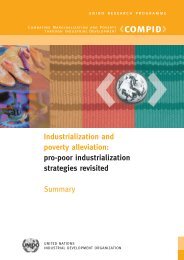Manual on the Development of Cleaner Production Policies ... - Unido
Manual on the Development of Cleaner Production Policies ... - Unido
Manual on the Development of Cleaner Production Policies ... - Unido
Create successful ePaper yourself
Turn your PDF publications into a flip-book with our unique Google optimized e-Paper software.
DEVELOPMENT OF CP POLICY<br />
MODULE 3: CP POLICY DEVELOPMENT CYCLE<br />
<strong>Cleaner</strong> producti<strong>on</strong> is a c<strong>on</strong>cept that calls for understanding and approval by society as a whole. In<br />
order to publicize it (let al<strong>on</strong>e mainstream it) successfully, a broad coaliti<strong>on</strong> needs to be formed that<br />
will draw various stakeholders into <strong>the</strong> effort. The advantage <strong>of</strong> this approach is that it makes <strong>the</strong><br />
policy process less sensitive to political change. While Governments may be reorganized at <strong>the</strong> time <strong>of</strong><br />
electi<strong>on</strong>s, more <strong>of</strong>ten than not <strong>the</strong> work <strong>of</strong> <strong>the</strong> private sector, associati<strong>on</strong>s <strong>of</strong> industry, academia and<br />
n<strong>on</strong>-governmental organizati<strong>on</strong>s (NGOs) is largely unaffected. Building a coaliti<strong>on</strong> <strong>of</strong> <strong>the</strong>se sectors<br />
and ensuring <strong>the</strong>ir support prevents <strong>the</strong> paralysis <strong>of</strong> a policy process as a result <strong>of</strong> a political<br />
reshuffling.<br />
CP policy development should be supported by <strong>the</strong> most senior level <strong>of</strong> decisi<strong>on</strong> makers. The backing<br />
and/or participati<strong>on</strong> <strong>of</strong> a government minister, <strong>the</strong> chairman <strong>of</strong> <strong>the</strong> envir<strong>on</strong>mental commissi<strong>on</strong> <strong>of</strong> a<br />
nati<strong>on</strong>al assembly, or <strong>the</strong> president <strong>of</strong> a chamber <strong>of</strong> industry, can <strong>of</strong>ten determine whe<strong>the</strong>r or not a CP<br />
programme results in a supporting policy.<br />
Both <strong>the</strong> ownership structure and existing market c<strong>on</strong>diti<strong>on</strong>s should create incentives to reduce<br />
producti<strong>on</strong> costs. State subsidies for resources or protecti<strong>on</strong>ism in favour <strong>of</strong> State-owned and<br />
-managed enterprises, for example, do not give <strong>the</strong> right signals to promote efficiency. CP is even<br />
more efficient when it is also integrated into n<strong>on</strong>-envir<strong>on</strong>mental policies, for instance, by promoting<br />
CP as a tool to improve competitiveness. The mainstreaming <strong>of</strong> CP is c<strong>on</strong>sidered <strong>the</strong> most effective<br />
way to achieve both envir<strong>on</strong>mental and ec<strong>on</strong>omic benefits and to create c<strong>on</strong>diti<strong>on</strong>s for its sustainable<br />
applicati<strong>on</strong>.<br />
Finally, <strong>the</strong> role <strong>of</strong> <strong>the</strong> CP centre itself cannot be overestimated. If it is to have any impact <strong>on</strong> policy, a<br />
CP centre must be str<strong>on</strong>g and active and enjoy <strong>the</strong> full support <strong>of</strong> its stakeholders. NCPCs have several<br />
natural attributes for <strong>the</strong> policy role. The fact that a CPC is rarely located within a government<br />
structure nor is it an individual c<strong>on</strong>sultancy, lends CP centres <strong>the</strong>ir independent and n<strong>on</strong>-partisan<br />
character. Provided a CP centre is able to build a sufficiently high pr<strong>of</strong>ile, it is likely to be acceptable<br />
to a variety <strong>of</strong> stakeholders.<br />
SLIDE: Specific steps in policy development<br />
• Stakeholder analysis;<br />
• CP awareness-raising am<strong>on</strong>g policy makers;<br />
• Setting up a high-level steering committee;<br />
• Establishment <strong>of</strong> a technical policy development group;<br />
• Evaluati<strong>on</strong> <strong>of</strong> <strong>the</strong> existing system;<br />
• Building a c<strong>on</strong>sensus and comm<strong>on</strong> goal;<br />
• Identificati<strong>on</strong> <strong>of</strong> priorities and focus areas;<br />
• Define clear and measurable objectives.<br />
PAGE 51
















